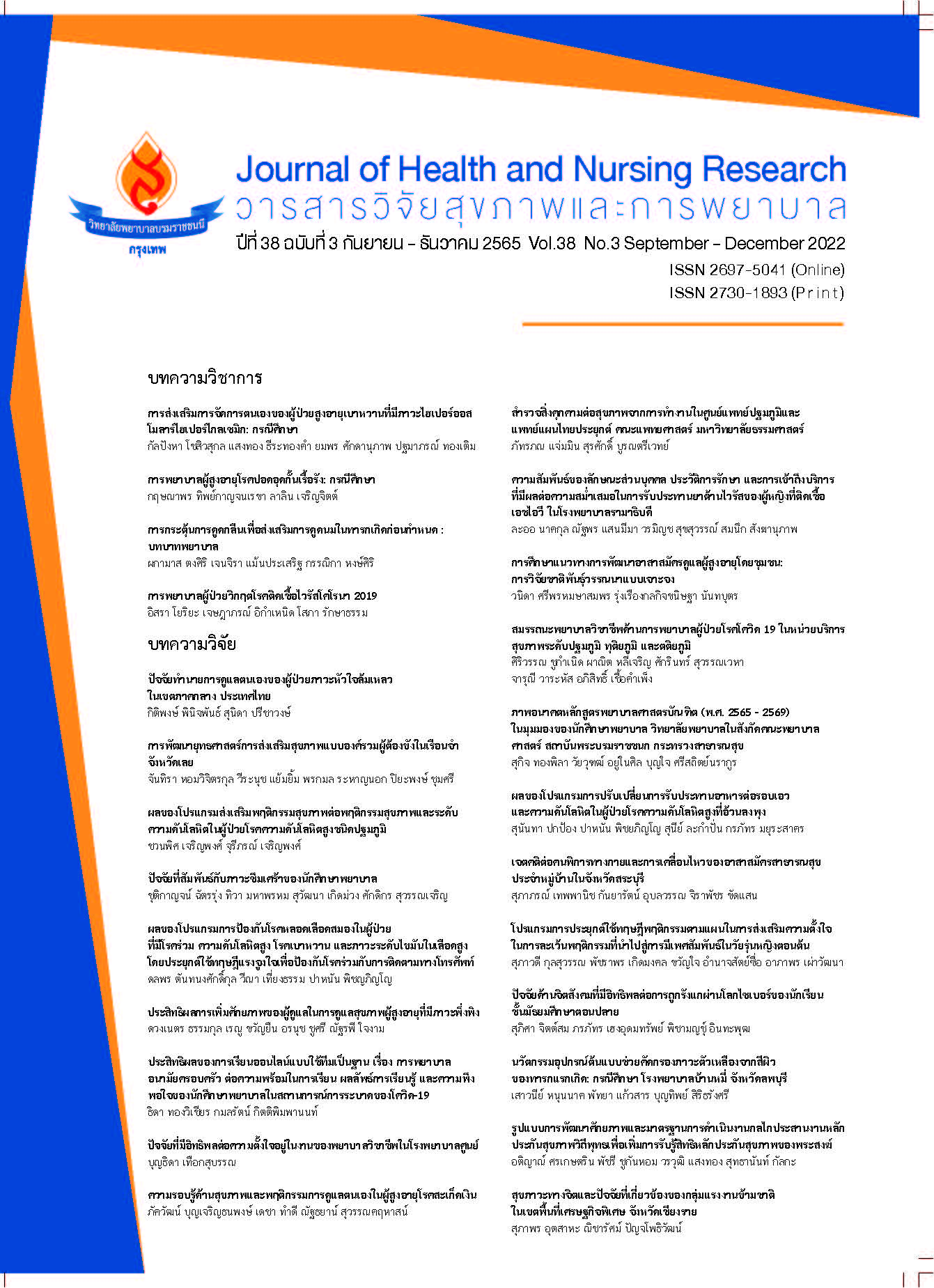ผลของโปรแกรมส่งเสริมพฤติกรรมสุขภาพต่อพฤติกรรมสุขภาพและระดับ ความดันโลหิตในผู้ป่วยโรคความดันโลหิตสูงชนิดปฐมภูมิ
คำสำคัญ:
โปรแกรมส่งเสริมพฤติกรรมสุขภาพ, ผู้ป่วยโรคความดันโลหิตสูงชนิดปฐมภูมิบทคัดย่อ
บทนำ: โรคความดันโลหิตสูงเป็นโรคเรื้อรังที่รักษาไม่หายขาดและต้องรักษาต่อเนื่อง หากไม่สามารถควบคุมระดับความดันโลหิตได้อาจจะส่งผลให้เกิดภาวะแทรกซ้อนที่ทำให้พิการหรืออันตรายถึงเสียชีวิต
วัตถุประสงค์การวิจัย: เพื่อศึกษาผลของโปรแกรมส่งเสริมพฤติกรรมสุขภาพต่อพฤติกรรมสุขภาพและระดับความดันโลหิตในผู้ป่วยโรคความดันโลหิตสูงชนิดปฐมภูมิ
ระเบียบวิธีวิจัย: การวิจัยครั้งนี้เป็นการวิจัยกึ่งทดลองแบบหนึ่งกลุ่มวัดก่อนและหลังการทดลอง กลุ่มตัวอย่างคือ ผู้ป่วยที่ได้รับการวินิจฉัยว่าเป็นโรคความดันโลหิตสูงชนิดปฐมภูมิ โรงพยาบาลส่งเสริมสุขภาพตำบลในจังหวัดปทุมธานี โดยการคัดเลือกแบบเจาะจง จำนวน 30 คน กลุ่มตัวอย่างได้รับโปรแกรมการส่งเสริมการรับรู้ความสามารถตนเอง การรับรู้ความรุนแรง และความเสี่ยงตามแบบแผนความเชื่อด้านสุขภาพ เป็นเวลา 8 สัปดาห์ เครื่องมือที่ใช้ในการเก็บรวบรวมข้อมูล ได้แก่ แบบสอบถามพฤติกรรมสุขภาพและเครื่องวัดความดันโลหิต วิเคราะห์ข้อมูลโดยใช้ค่าเฉลี่ย ร้อยละ ส่วนเบี่ยงเบนมาตรฐาน และสถิติอ้างอิง dependent t- test
ผลการวิจัย: พบว่า หลังเข้ารับโปรแกรมส่งเสริมพฤติกรรมสุขภาพ กลุ่มตัวอย่างมี ค่าเฉลี่ยพฤติกรรมสุขภาพสูงกว่าก่อนเข้าร่วมโปรแกรมอย่างมีนัยสำคัญทางสถิติ (p < .05) และมีค่าเฉลี่ยระดับความดันโลหิตลดลงกว่าก่อนเข้าร่วมโปรแกรมอย่างมีนัยสำคัญทางสถิติ (p < .05)
สรุปผล: ผลของโปรแกรมส่งเสริมพฤติกรรมสุขภาพ ทำให้ผู้ป่วยโรคความดันโลหิตสูงมีการปรับเปลี่ยนพฤติกรรมเพื่อควบคุมระดับความดันโลหิต ส่งผลให้ระดับความดันโลหิตลดลง
ข้อเสนอแนะการนำผลการวิจัยไปใช้: ผู้ให้บริการด้านสุขภาพควรนำโปรแกรมส่งเสริมพฤติกรรมสุขภาพไปปรับเปลี่ยนพฤติกรรมผู้ป่วยโรคความดันโลหิตสูงอย่างต่อเนื่องเพื่อควบคุมระดับความดันโลหิต
Downloads
เอกสารอ้างอิง
World Hypertension League (WHL). World hypertension day campaign substance: 2019 [Internet]. 2021[cited 2021 October 1]. Available from:http://www.whleague.org/index.php/features/ world-hypertension-day.
Ministry of Health. Office of policy and strategy; Health statistics A.D 2019: Bangkok: Sam Jaroenpanich;2020. Contract No: ISSN 08573093.
Punmung N, Yolertlob A, Lutti S. World hypertension day campaign substance 2019 [Internet]. 2021 [cited 2021 Sep 1]. Available from: http://www. thaincd.com > Hypertension Day Campaign Substance.
Sukontasorn A.Thai guidelines on the treatment of hypertension associate. Bangkok. Non-communicable diseases, CDC. 2020. Contract No. ISBN 9786169332008
Sriwanichakorn S, Kumwangsa P, Kaewta S. NCD report: diabetes, hypertension and related risk factors 2020 [Internet]. 2020 [cited 2021 October 1]. Available from: http://www.thaincd.com/2016/mission
Janz NK, Becker MH. The Health Belief Model: A decade later view all authors and affiliations [Internet] 1984. [cited 2021 September 30]. Available from: https://doi.org/10.1177/109019818401100101.
Rosenstock IM. The health belief model and preventive health behavior. Health education Monographs 1974;2(4);354-86.
Promyu R. Effect of hypertension care program on hypertensive patients self-care behavior [master, s thesis]. Phitsanulok: Naresuan University;2015. (in Thai).
Bandura A. Self-efficacy: Toward a unifying theory of behavior change [Internet] 1977. [ cited 2021 October 2]. Available from:http://www.simplypsychology.org /self-efficacy.html
Srisiri S. Effect of self-efficacy and self-regulation program on health behavioral among elderly hypertensive patients, Health center 19 Wong-sawang, Bangkok Metropolitan. J: Faculty of Physical Education 2012;15:308-15.
Nakling Y. Effects of self-efficacy enhancement program on health behaviors among elder adults with uncontrolled hypertension. [master, s thesis]. Bangkok: Mahidol University; 2012. (in Thai).
Faul F, Erdfelder E, Lang A-G, Buchner A. G*Power 3: A flexible statistical power analysis program for the social, behavioral, and biomedical sciences. Behavior Research Methods 2007;39:175-191.
Faul F, Erdfelder E, Buchner A, Lang A.-G. Statistical power analyses using G*Power 3.1: Tests for correlation and regression analyses. Behavior Research Methods 2009; 41:1149-1160.
Cohen J. Statistical power analysis for the behavioral sciences. 2nded. New York: Lawrence Erlbaum Associates; 2013.
Anantasarun D. Effect of health promotion program on self-care behavior and blood pressure in hypertensive elderly with uncontrolled hypertension, Maueng Lang suan, Chumporn. Medical Journal Region 11 2016;30(4):299-311. (in Thai).
Craddick SR, Elmer J, Obarzanex E, Vollmer M, Svetkey P. The DASH diet and blood pressure [Internet]. 2021 [Cited 2021 September]. Available from: https://www.ncbi.nlm.nih.gov/pubmed/1452568.
Sontto N, Chirapongsuwan C, Ravirakul T. Results of the pruitin pressure control Metallurgical Program in the 35-39 age group, hypertension is not controlled. Boromarajonani College of Nursing, Uttraradit Journal 2016;8(1):1-13 (in Thai).
Kaewkhen S, Tongpoon S. Effectiveness of white-horse exercises applied to the folk art of the elderly. Journal of Nursing Science and Health 2017;11(3):120-26. (in Thai).
Kantradudhi S. SKT Meditation Therapy 2011 [Internet]. 2021 [cited 2021 March 10]. Available from: http://www.gotoknow.org./posts/439655. (in Thai).
Chuenkitiyanon S, Khumros W. Effectiveness of meditation therapy (SKT) to reduce blood sugar level and blood pressure in Thai monks, at Phasi-Charoen district, Bangkok 2018 [Internet]. 2021 [cited 2021 May 5]. Available from: http://www.e-research,Siam.Edu/kb/ Effectiveness of… (in Thai).
Phrasawang N. Effects of meditation (SKT) to essential hypertensive patients in primary health care hospital. J of Nursing Science and Health 2020;36(1):33-42. (in Thai).
Puranamaneeviwat P, Danyuthasilpe C, Nusorn N, Prachanban P. Effects of health behavioral change program among essential hypertension patients. Journal of Nursing Science and Health 2020;36(1):33-42.
ดาวน์โหลด
เผยแพร่แล้ว
รูปแบบการอ้างอิง
ฉบับ
ประเภทบทความ
สัญญาอนุญาต
ลิขสิทธิ์ (c) 2022 วารสารวิจัยสุขภาพและการพยาบาล (วารสารวิทยาลัยพยาบาลบรมราชชนนี กรุงเทพ)

อนุญาตภายใต้เงื่อนไข Creative Commons Attribution-NonCommercial 4.0 International License.
บทความที่ได้รับการตีพิมพ์ เป็นลิขสิทธิ์ของวารสารวิจัยสุขภาพและการพยาบาล (วิทยาลัยพยาบาลบรมราชชนนี กรุงเทพ) ไม่สามารถนำไปตีพิมพ์ซ้ำในวารสารฉบับอื่น


















